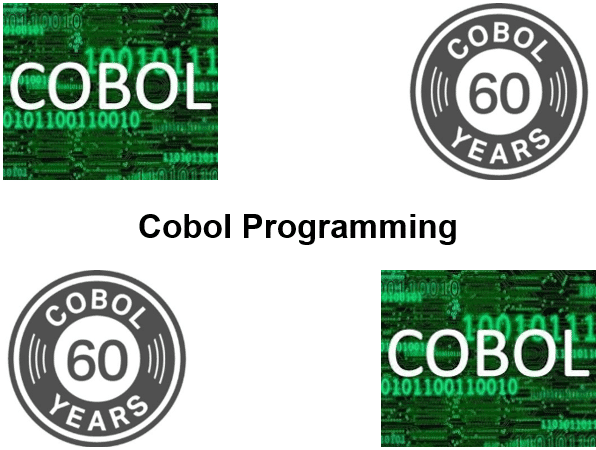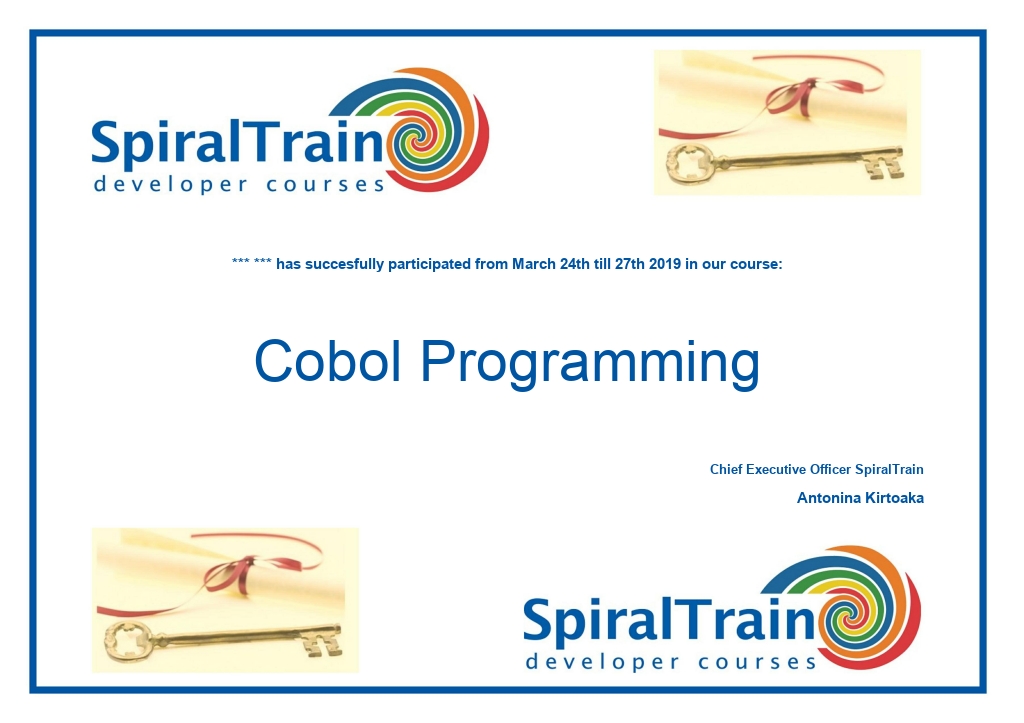-
Learning by doing
-
Trainers with practical experience
-
Classroom training
-
Detailed course material
-
Clear content description
-
Tailormade content possible
-
Training that proceeds
-
Small groups
In the course Cobol Programming from SpiralTrain participants learn to develop applications in the Common Business Oriented Language (COBOL). Cobol emerged from the Conference on Data Systems Language (CODASYL) in 1959, when more and more companies in the Western World needed to automate business processes. Cobol is still widely used in banks and insurance companies, but has undergone many changes since its early days. Since the COBOL 2002 standard, Cobol also supports object-oriented programming.
The course starts with an overview of Cobol's typical features and program structure. The Cobol Metalanguage, Divisions, Sections, Paragraphs, Sentences and Statements are discussed.
Subsequently the use of Data Declarations and Procedure Divisions is treated. Attention is paid to literals, constants, variables, structured data and assignment. And also input and output and various verbs are discussed such as ACCEPT, DISPLAY, COMPUTE, ADD, SUBTRACT, MULTIPLY and DIVIDE.
Furthermore control flow constructions in Cobol with selections and iterations are part of the course program. This includes condition types, truth tables, decision tables, the EVALUATE Metalanguage and also PERFORM..THRU, PERFORM..TIMES and PERFORM..VARYING.
After a discussion of subroutines in Cobol, it is the turn of a treatment of reading and writing sequential files.
Attention is paid to Records, Fields, Record Buffers, Variable-Length Records and the operations SELECT, ASSIGN, OPEN, CLOSE, READ and WRITE.
Finally the use of tabular data, arrays and strings in Cobol is explained and the course ends with the treatment of object oriented programming in Cobol with modules and classes.
The course Cobol Programming is intended for anyone who wants to learn programming in the Cobol programming language.
To participate in this course basic knowledge of programming in another programming language is beneficial to understanding but is not required.
The theory is discussed on the basis of presentation slides. The theory is further explained through demos. After discussing a module, there is the possibility to practice. Course times are from 9.30 to 16.30.
After successful completion of the course the participants receive an official certificate Cobol Programming.

Module 1 : Cobol Intro |
Module 2 : Data Declaration |
Module 3 : Procedure Division |
|
Cobol Origins Versions of Cobol Cobol Idiosyncrasies Noise Words Cobol Metalanguage Program Structure Divisions and Sections Paragraphs and Sentences Statements Coding Rules Micro Focus Cobol Installing Cobol |
Alphanumeric Literals Numeric Literals Figurative Constants Data Items or Variables Type Enforcement Alphabetic Data Declaring Data PICTURE Clause Assignments MOVE Verb Structured Data Data Hierarchy |
Input and Output ACCEPT Verb DISPLAY Verb System Variables Common Arithmetic ROUNDED Phrase ON SIZE ERROR COMPUTE Verb ADD Verb SUBTRACT Verb MULTIPLY Verb DIVIDE Verb |
Module 4 : Selection |
Module 5 : Iteration |
Module 6 : Sequential Files |
|
IF Statement Condition Types Relation and Class Sign and Complex Truth Tables Implied Subjects Nested IF's END-IF vs. Period SET Verb Metalanguage Decision Tables EVALUATE Metalanguage |
Open Subroutines Closed Subroutines PERFORM NamedBlock PERFORM..THRU Dangers PERFORM..TIMES Inline Execution Out-of-Line Execution PERFORM..UNTIL UNTIL Condition PERFORM..VARYING WITH TEST |
Records and Fields Processing Files Implications of Buffers Creating Records Record Buffers SELECT and ASSIGN OPEN and CLOSE READ and WRITE Multiple Records Type Code Variable-Length Records |
Module 7 : Tabular Data |
Module 8 : String Manipulation |
Module 9 : Classes and Objects |
|
Tables vs. Arrays Declaring Tables OCCURS Clause Rules Subscript Rules Multidimensional Tables Prefilled Tables SEARCH and SEARCH ALL INDEXED BY Clause Using SET KEY IS Clause Binary Search |
INSPECT Verb INSPECT .. TALLYING Modifying Phrases INSPECT .. REPLACING INSPECT .. CONVERTING String Concatenation STRING Verb String Splitting Data-Movement Termination UNSTRING Termination Reference Modification |
Module Strength Module Coupling Dictionary Class Cobol Classes Objects and Methods Registering Classes Object References Destroying Objects Object Identifiers SUPER and SELF Scope Issues |
